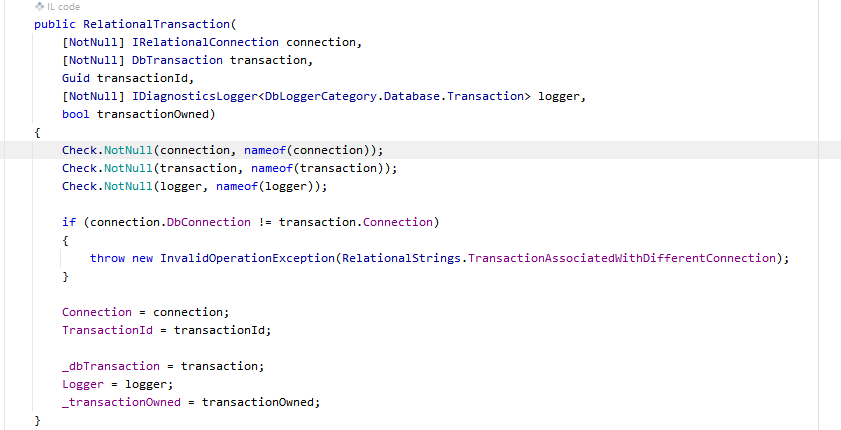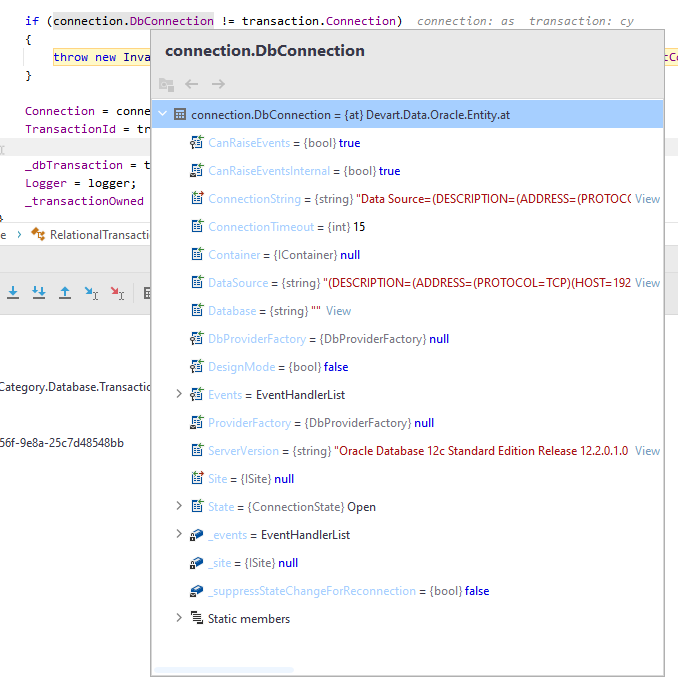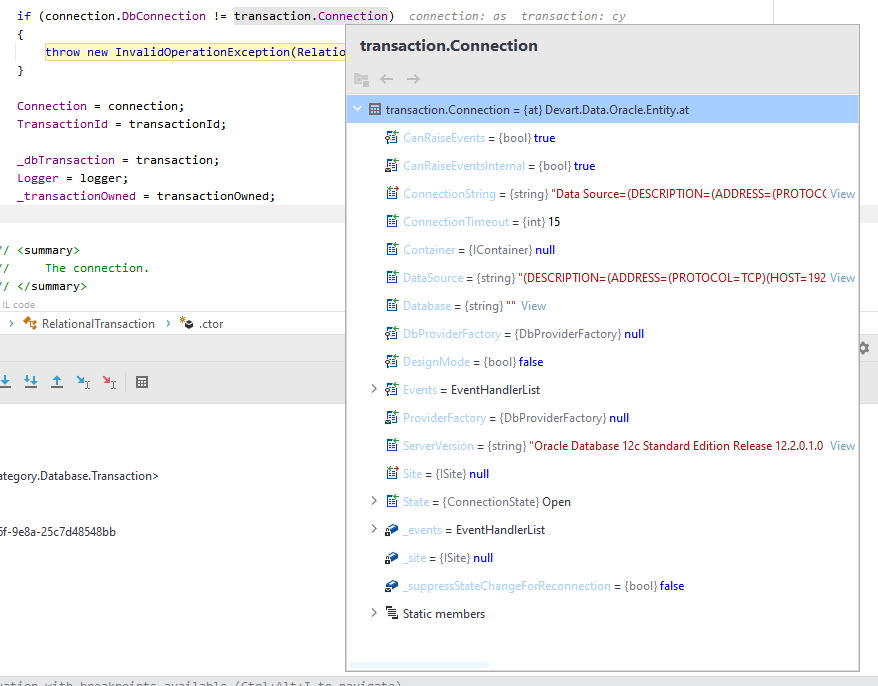Activities of "bhyatz"
@alper. We have all our code already deployed to production with the devart driver and the migrations for the versions have all been done with devart. Changing to the oracle provider may break our deployed code.
We also have a large amount of data in our production database, and it will not be easy to change our migrations from devart to oracle if the oracle migrations are not compatible with devart. We have 243 entities and large volume of data already in the entities.
@alper . Is there an estimated time when this issue will be resolved as it is preventing us from updating to version 4. We are still on version 3.0.4.
@alper. The database creation does not break. You need to run the Dbmigrator project. The code breaks in the data seeding. I followed your steps again. but when I run the DbMigrator project I get the error.
C:\tmp\abp\aspnet-core\src\NexBase.EntityFrameworkCore.DbMigrations>dotnet ef -s ..\NexBase.DbMigrator database update Build started... Build succeeded. The Entity Framework tools version '5.0.3' is older than that of the runtime '5.0.4'. Update the tools for the latest features and bug fixes. Applying migration '20210310150827_Initial'. Done.
C:\tmp\abp\aspnet-core\src\NexBase.EntityFrameworkCore.DbMigrations>cd ..
C:\tmp\abp\aspnet-core\src>cd NexBase.DbMigrator
C:\tmp\abp\aspnet-core\src\NexBase.DbMigrator>dotnet run
[17:15:03 INF] Started database migrations...
[17:15:03 INF] Migrating schema for host database...
[17:15:04 INF] Executing host database seed...
Unhandled exception. System.InvalidOperationException: The specified transaction is not associated with the current connection. Only transactions associated with the current connection may be used.
at Microsoft.EntityFrameworkCore.Storage.RelationalTransaction..ctor(IRelationalConnection connection, DbTransaction transaction, Guid transactionId, IDiagnosticsLogger1 logger, Boolean transactionOwned) at Microsoft.EntityFrameworkCore.Storage.RelationalTransactionFactory.Create(IRelationalConnection connection, DbTransaction transaction, Guid transactionId, IDiagnosticsLogger1 logger, Boolean transactionOwned)
at Microsoft.EntityFrameworkCore.Storage.RelationalConnection.CreateRelationalTransaction(DbTransaction transaction, Guid transactionId, Boolean transactionOwned)
at Microsoft.EntityFrameworkCore.Storage.RelationalConnection.UseTransactionAsync(DbTransaction transaction, Guid transactionId, CancellationToken cancellationToken)
at Volo.Abp.Uow.EntityFrameworkCore.UnitOfWorkDbContextProvider1.CreateDbContextWithTransactionAsync(IUnitOfWork unitOfWork) at Volo.Abp.Uow.EntityFrameworkCore.UnitOfWorkDbContextProvider1.CreateDbContextAsync(IUnitOfWork unitOfWork)
at Volo.Abp.Uow.EntityFrameworkCore.UnitOfWorkDbContextProvider1.CreateDbContextAsync(IUnitOfWork unitOfWork, String connectionStringName, String connectionString) at Volo.Abp.Uow.EntityFrameworkCore.UnitOfWorkDbContextProvider1.GetDbContextAsync()
at Volo.Abp.Domain.Repositories.EntityFrameworkCore.EfCoreRepository2.GetDbSetAsync() at Volo.Abp.Identity.EntityFrameworkCore.EfCoreIdentityUserRepository.FindByNormalizedUserNameAsync(String normalizedUserName, Boolean includeDetails, CancellationToken cancellationToken) at Castle.DynamicProxy.AsyncInterceptorBase.ProceedAsynchronous[TResult](IInvocation invocation, IInvocationProceedInfo proceedInfo) at Volo.Abp.Castle.DynamicProxy.CastleAbpMethodInvocationAdapterWithReturnValue1.ProceedAsync()
at Volo.Abp.Uow.UnitOfWorkInterceptor.InterceptAsync(IAbpMethodInvocation invocation)
at Volo.Abp.Castle.DynamicProxy.CastleAsyncAbpInterceptorAdapter1.InterceptAsync[TResult](IInvocation invocation, IInvocationProceedInfo proceedInfo, Func3 proceed)
at Volo.Abp.Identity.IdentityDataSeeder.SeedAsync(String adminEmail, String adminPassword, Nullable1 tenantId) at Castle.DynamicProxy.AsyncInterceptorBase.ProceedAsynchronous[TResult](IInvocation invocation, IInvocationProceedInfo proceedInfo) at Volo.Abp.Castle.DynamicProxy.CastleAbpMethodInvocationAdapterWithReturnValue1.ProceedAsync()
at Volo.Abp.Uow.UnitOfWorkInterceptor.InterceptAsync(IAbpMethodInvocation invocation)
at Volo.Abp.Castle.DynamicProxy.CastleAsyncAbpInterceptorAdapter1.InterceptAsync[TResult](IInvocation invocation, IInvocationProceedInfo proceedInfo, Func3 proceed)
at Volo.Abp.Data.DataSeeder.SeedAsync(DataSeedContext context)
at Castle.DynamicProxy.AsyncInterceptorBase.ProceedAsynchronous(IInvocation invocation, IInvocationProceedInfo proceedInfo)
at Volo.Abp.Castle.DynamicProxy.CastleAbpMethodInvocationAdapter.ProceedAsync()
at Volo.Abp.Uow.UnitOfWorkInterceptor.InterceptAsync(IAbpMethodInvocation invocation)
at Volo.Abp.Castle.DynamicProxy.CastleAsyncAbpInterceptorAdapter1.InterceptAsync(IInvocation invocation, IInvocationProceedInfo proceedInfo, Func3 proceed)
at NexBase.Data.NexBaseDbMigrationService.SeedDataAsync(Tenant tenant) in C:\tmp\abp\aspnet-core\src\NexBase.Domain\Data\NexBaseDbMigrationService.cs:line 107
at NexBase.Data.NexBaseDbMigrationService.MigrateAsync() in C:\tmp\abp\aspnet-core\src\NexBase.Domain\Data\NexBaseDbMigrationService.cs:line 57
at NexBase.DbMigrator.DbMigratorHostedService.StartAsync(CancellationToken cancellationToken) in C:\tmp\abp\aspnet-core\src\NexBase.DbMigrator\DbMigratorHostedService.cs:line 30
at Microsoft.Extensions.Hosting.Internal.Host.StartAsync(CancellationToken cancellationToken)
at Microsoft.Extensions.Hosting.HostingAbstractionsHostExtensions.RunAsync(IHost host, CancellationToken token)
at Microsoft.Extensions.Hosting.HostingAbstractionsHostExtensions.RunAsync(IHost host, CancellationToken token)
at NexBase.DbMigrator.Program.Main(String[] args) in C:\tmp\abp\aspnet-core\src\NexBase.DbMigrator\Program.cs:line 29
at NexBase.DbMigrator.Program.<Main>(String[] args)
@alper
Are you still looking at this issue?
@alper. Thanks. I am getting the problem with a new solution in v4.2.1. My upgraded solution, I am getting the error on many other webapi services.
Debugging it, I get the error in this code in Microsoft.EntityFrameworkCore.Storage The connection.DbConnection and the transaction.Connection are not the same object.
when debugging there is only one connection defined, so it looks like somewhere in the transaction a new connection is opened
<br> <br>
I tried the work around. I changed the original code to the new code however I am still getting the same error. Original:
public override void ConfigureServices(ServiceConfigurationContext context)
{
context.Services.AddAbpDbContext<NexBaseDbContext>(options =>
{
/* Remove "includeAllEntities: true" to create
* default repositories only for aggregate roots */
options.AddDefaultRepositories(includeAllEntities: true);
});
Configure<AbpDbContextOptions>(options =>
{
/* The main point to change your DBMS.
* See also NexBaseMigrationsDbContextFactory for EF Core tooling. */
options.UseOracle();
});
}
New:
public override void ConfigureServices(ServiceConfigurationContext context)
{
context.Services.AddAbpDbContext<NexBaseDbContext>(options =>
{
/* Remove "includeAllEntities: true" to create
* default repositories only for aggregate roots */
options.AddDefaultRepositories(includeAllEntities: true);
});
Configure<AbpDbContextOptions>(options =>
{
/* The main point to change your DBMS.
* See also NexBaseMigrationsDbContextFactory for EF Core tooling. */
//options.UseOracle();
options.Configure(ctx => { ctx.DbContextOptions.UseOracle(ctx.ConnectionString); });
});
}
ading.Tasks.Task`1[Volo.Abp.Account.Public.Web.Areas.Account.Controllers.Models.AbpLoginResult] Login(Volo.Abp.Account.Public.Web.Areas.Account.Controllers.Mod
els.UserLoginInfo) on controller Volo.Abp.Account.Public.Web.Areas.Account.Controllers.AccountController (Volo.Abp.Account.Pro.Public.Web).
[06:57:50 DBG] Login Url: /Account/Login
[06:57:50 DBG] Login Return Url Parameter: ReturnUrl
[06:57:50 DBG] Logout Url: /Account/Logout
[06:57:50 DBG] ConsentUrl Url: /Consent
[06:57:50 DBG] Consent Return Url Parameter: returnUrl
[06:57:50 DBG] Error Url: /Account/Error
[06:57:50 DBG] Error Id Parameter: errorId
[06:57:51 ERR] ---------- RemoteServiceErrorInfo ----------
{
"code": null,
"message": "An internal error occurred during your request!",
"details": null,
"data": {},
"validationErrors": null
}
[06:57:51 ERR] The specified transaction is not associated with the current connection. Only transactions associated with the current connection may be used.
System.InvalidOperationException: The specified transaction is not associated with the current connection. Only transactions associated with the current connec
tion may be used.
at Microsoft.EntityFrameworkCore.Storage.RelationalTransaction..ctor(IRelationalConnection connection, DbTransaction transaction, Guid transactionId, IDiagn
osticsLogger`1 logger, Boolean transactionOwned)
at Microsoft.EntityFrameworkCore.Storage.RelationalTransactionFactory.Create(IRelationalConnection connection, DbTransaction transaction, Guid transactionId
, IDiagnosticsLogger`1 logger, Boolean transactionOwned)
at Microsoft.EntityFrameworkCore.Storage.RelationalConnection.CreateRelationalTransaction(DbTransaction transaction, Guid transactionId, Boolean transaction
Owned)
at Microsoft.EntityFrameworkCore.Storage.RelationalConnection.UseTransactionAsync(DbTransaction transaction, Guid transactionId, CancellationToken cancellat
ionToken)
at Volo.Abp.Uow.EntityFrameworkCore.UnitOfWorkDbContextProvider`1.CreateDbContextWithTransactionAsync(IUnitOfWork unitOfWork)
at Volo.Abp.Uow.EntityFrameworkCore.UnitOfWorkDbContextProvider`1.CreateDbContextAsync(IUnitOfWork unitOfWork)
at Volo.Abp.Uow.EntityFrameworkCore.UnitOfWorkDbContextProvider`1.CreateDbContextAsync(IUnitOfWork unitOfWork, String connectionStringName, String connectio
nString)
at Volo.Abp.Uow.EntityFrameworkCore.UnitOfWorkDbContextProvider`1.GetDbContextAsync()
at Volo.Abp.Domain.Repositories.EntityFrameworkCore.EfCoreRepository`2.GetDbSetAsync()
at Volo.Abp.FeatureManagement.EntityFrameworkCore.EfCoreFeatureValueRepository.GetListAsync(String providerName, String providerKey)
at Castle.DynamicProxy.AsyncInterceptorBase.ProceedAsynchronous[TResult](IInvocation invocation, IInvocationProceedInfo proceedInfo)
at Volo.Abp.Castle.DynamicProxy.CastleAbpMethodInvocationAdapterWithReturnValue`1.ProceedAsync()
at Volo.Abp.Uow.UnitOfWorkInterceptor.InterceptAsync(IAbpMethodInvocation invocation)
at Volo.Abp.Castle.DynamicProxy.CastleAsyncAbpInterceptorAdapter`1.InterceptAsync[TResult](IInvocation invocation, IInvocationProceedInfo proceedInfo, Func`
3 proceed)
at Volo.Abp.FeatureManagement.FeatureManagementStore.SetCacheItemsAsync(String providerName, String providerKey, String currentName, FeatureValueCacheItem c
urrentCacheItem)
at Volo.Abp.FeatureManagement.FeatureManagementStore.GetCacheItemAsync(String name, String providerName, String providerKey)
at Volo.Abp.FeatureManagement.FeatureManagementStore.GetOrNullAsync(String name, String providerName, String providerKey)
at Castle.DynamicProxy.AsyncInterceptorBase.ProceedAsynchronous[TResult](IInvocation invocation, IInvocationProceedInfo proceedInfo)
at Volo.Abp.Castle.DynamicProxy.CastleAbpMethodInvocationAdapterWithReturnValue`1.ProceedAsync()
at Volo.Abp.Uow.UnitOfWorkInterceptor.InterceptAsync(IAbpMethodInvocation invocation)
at Volo.Abp.Castle.DynamicProxy.CastleAsyncAbpInterceptorAdapter`1.InterceptAsync[TResult](IInvocation invocation, IInvocationProceedInfo proceedInfo, Func`
3 proceed)
at Volo.Abp.Features.TenantFeatureValueProvider.GetOrNullAsync(FeatureDefinition feature)
at Volo.Abp.Features.FeatureChecker.GetOrNullValueFromProvidersAsync(IEnumerable`1 providers, FeatureDefinition feature)
at Volo.Abp.Features.FeatureChecker.GetOrNullAsync(String name)
at Volo.Abp.Features.FeatureCheckerBase.IsEnabledAsync(String name)
at Volo.Abp.Account.Public.Web.Ldap.LdapExternalLoginProvider.TryAuthenticateAsync(String userName, String plainPassword)
at Volo.Abp.Identity.AspNetCore.AbpSignInManager.PasswordSignInAsync(String userName, String password, Boolean isPersistent, Boolean lockoutOnFailure)
at Volo.Abp.Account.Public.Web.Areas.Account.Controllers.AccountController.Login(UserLoginInfo login)
at lambda_method1998(Closure , Object )
at Microsoft.AspNetCore.Mvc.Infrastructure.ActionMethodExecutor.AwaitableObjectResultExecutor.Execute(IActionResultTypeMapper mapper, ObjectMethodExecutor e
xecutor, Object controller, Object[] arguments)
at Microsoft.AspNetCore.Mvc.Infrastructure.ControllerActionInvoker.<InvokeActionMethodAsync>g__Awaited|12_0(ControllerActionInvoker invoker, ValueTask`1 ac at Microsoft.AspNetCore.Mvc.Infrastructure.ActionMethodExecutor.AwaitableObjectResultExecutor.Execute(IActionResultTypeMapper mapper, ObjectMethodExecutor
executor, Object controller, Object[] arguments)
at Microsoft.AspNetCore.Mvc.Infrastructure.ControllerActionInvoker.<InvokeActionMethodAsync>g__Awaited|12_0(ControllerActionInvoker invoker, ValueTask`1 ac
tionResultValueTask)
at Microsoft.AspNetCore.Mvc.Infrastructure.ControllerActionInvoker.<InvokeNextActionFilterAsync>g__Awaited|10_0(ControllerActionInvoker invoker, Task lastT
ask, State next, Scope scope, Object state, Boolean isCompleted)
at Microsoft.AspNetCore.Mvc.Infrastructure.ControllerActionInvoker.Rethrow(ActionExecutedContextSealed context)
at Microsoft.AspNetCore.Mvc.Infrastructure.ControllerActionInvoker.Next(State& next, Scope& scope, Object& state, Boolean& isCompleted)
at Microsoft.AspNetCore.Mvc.Infrastructure.ControllerActionInvoker.InvokeInnerFilterAsync()
--- End of stack trace from previous location ---
at Microsoft.AspNetCore.Mvc.Infrastructure.ResourceInvoker.<InvokeNextExceptionFilterAsync>g__Awaited|25_0(ResourceInvoker invoker, Task lastTask, State ne
xt, Scope scope, Object state, Boolean isCompleted)
Thank you for the quick response
Hi
Thanks. I got it working.
I am using identity server and the ui is angular.
I have currently implemented this by extending the Volo.Abp.Identity.IdentityUser and updating GetRolesAsync,IsInRoleAsync and GetActiveRoles to filter only the active roles. I am not sure if this is the best way or not.



